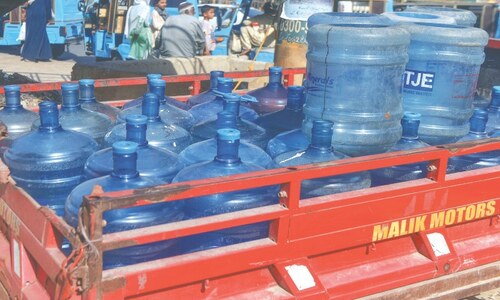- Approximately 1,500 cases of gastroenteritis are reported to CHK every day.
- According to experts, water poisoning is a typical occurrence in Karachi as a result of broken pipelines and unsanitary conditions at hydrants.
- Bottled water is too expensive for the average person.
KARACHI: Experts expressed concern about the city’s ongoing high rate of gastroenteritis cases and stated on Wednesday that the use of tainted water for drinking was a major contributing factor. They claimed that the scarcity of gas and its skyrocketing costs had forced many people to use water without boiling it.
They noted that the city’s water supplies had been repeatedly shown to be extremely contaminated and that in order to make the water safe to drink, it needed to be adequately boiled or filtered.
Doctors at the Dr Ruth Pfau Civil Hospital Karachi (CHK), where about 1,500 patients visit the emergency room every day, told Dawn that there has been an increase in gastroenteritis cases recently.
Currently, 70–80% of the cases that are reported to the hospital’s emergency room on a daily basis are due to gastroenteritis. Additionally, there are a few cases of cholera, according to Dr. Liaquat Ali Halo, extra medical superintendent at CHK.
He states that patients who complain of acute watery diarrhea are given intravenous fluids to help them rehydrate. While some patients need to be admitted, the majority are released after a few hours.
Regarding the causes of the rise in gastroenteritis cases, he stated that, in addition to eating tainted food from roadside stands and using inadequate hand hygiene, a key contributing factor to the city’s recurrent episodes of gastroenteritis outbreaks had been the lack of chlorination and filtration.
Inadequate cooking and consuming tainted raw food and vegetables can also lead to illnesses, Dr. Halo added. “Many patients tell us that they are forced to use unboiled water for drinking as gas supplies are highly inadequate in their localities and the filtered water has become costlier.”
Within the last ten days, 371 people with gastroenteritis have visited the Indus Hospital.
Over 80 patients were admitted to the hospital due to the sickness last month.
Regarding the recent surge in gastroenteritis cases, Dr Yahya Tunio of the Jinnah Postgraduate Medical Centre agreed.
At the emergency room, we receive about 200 cases of gastroenteritis every day. Many of these people have moderate-to-severe illnesses, and some are admitted for medical care, the speaker stated.
Dr. Yahya gave an explanation of how to make water safe to drink, stating that if boiling water was out of the question, then installing three-stage water filters at home would be a good idea.
Experts also identified the city’s antiquated water distribution infrastructure as an additional source of contamination.
They claimed that the general public was incurring significant expenses due to water-borne illnesses that could be readily avoided by guaranteeing the availability of clean water at the local level.
In response to a question on the state of public health in the city, senior general physician Dr. Altaf Hussain Khatri, who practices in the old city area, stated that the scarcity of gas combined with sharp increases in the cost of food and utilities has made it very difficult for low-income families to survive.
He stated, “The gas shortage has further compounded the miseries of the masses and compromised public health,” adding that respiratory infection patients were still coming to general practitioners in large numbers in addition to gastroenteritis.
He claimed, “They are very effective as they kill pathogens and filter sediments.”








